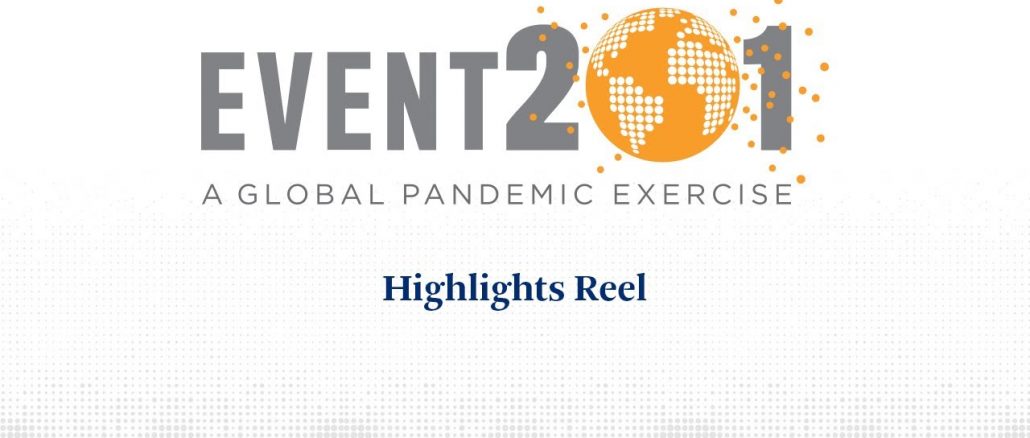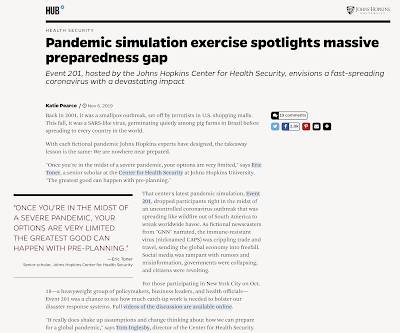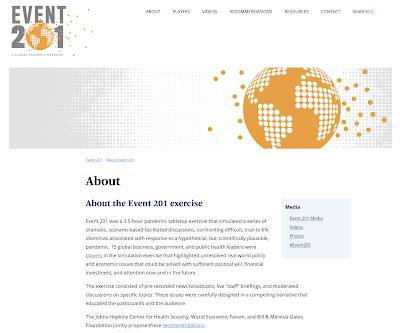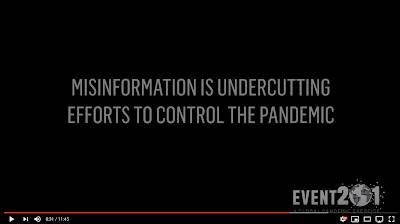
For those of you who are not aware, on October 18, 2019, Event 201 was held in New York City. This simulation event was hosted by the Johns Hopkins Center for Health Security and envisioned the impact of an outbreak of a coronavirus as it spread around the world. Event 201 was hosted in collaboration with the World Economic Forum and the Bill & Melinda Gates Foundation and included governments and NGOs along with leaders in the private sector including representatives from NBCUniversal, UPS and Johnson & Johnson. This is the fourth such exercise hosted by the Johns Hopkins Center; the first event called Dark Winter was held in 2001 and simulated a smallpox outbreak. Two other events, Atlantic Storm and Clade X were held in 2005 and 2019 respectively.
Here is the announcement for the event from the Johns Hopkins website:
Here is the Event 201 lead webpage from the Center for Health Security:
The purpose of the exercise is as follows:
"In recent years, the world has seen a growing number of epidemic events, amounting to approximately 200 events annually. These events are increasing, and they are disruptive to health, economies, and society. Managing these events already strains global capacity, even absent a pandemic threat. Experts agree that it is only a matter of time before one of these epidemics becomes global—a pandemic with potentially catastrophic consequences. A severe pandemic, which becomes “Event 201,” would require reliable cooperation among several industries, national governments, and key international institutions.
Recent economic studies show that pandemics will be the cause of an average annual economic loss of 0.7% of global GDP—or $570 billion. The players’ responses to the scenario illuminated the need for cooperation among industry, national governments, key international institutions, and civil society, to avoid the catastrophic consequences that could arise from a large-scale pandemic.
Similar to the Center’s 3 previous exercises—Clade X, Dark Winter, and Atlantic Storm—Event 201 aimed to educate senior leaders at the highest level of US and international governments and leaders in global industries.
It is also a tool to inform members of the policy and preparedness communities and the general public. This is distinct from many other forms of simulation exercises that test protocols or technical policies of a specific organization. Exercises similar to Event 201 are a particularly effective way to help policymakers gain a fuller understanding of the urgent challenges they could face in a dynamic, real-world crisis."
The following players were present:
Latoya Abbot – Marriott International
Sofia Borges – United Nations Foundation
Brad Connett – Henry Schein, Inc.
Christopher Elias – Bill & Melinda Gates Foundation
Timothy Evans – McGill University and World Bank
George Gao – Chinese Center for Disease Control and Prevention
Avril Haines – Columbia University and Johns Hopkins University
Jane Halton – ANZ Bank and Australian Strategic Policy Institute
Matthew Harrington – Edelman
Martin Knuchel – Lufthansa
Eduardo Martinez – UPS
Stephen Redd – CDC
Hasti Taghi – NBCUniversal
Adrian Thomas – Johnson & Johnson
Lavan Thiru – Monetary Authority of Singapore
With that background, let's look at a "highlights reel" that summarizes the simulation, noting the rather alarming sounding music that opens the video:
CAPS, the name coined for the simulation virus, creates the following scenario:
1.) Low and middle income nations are more affected by CAPS. Megacities and densely populated urban areas were particularly hard hit.
2.) Collaboration between the private sector and the World Health Organization/United Nations is necessary.
3.) Travel bookings are down 45 percent because of travel bans imposed by national governments.
4.) The pandemic is causing a global financial crisis. Banks were not lending and businesses were not borrowing.
5.) Certain businesses are facing crippling losses (i.e. hotel industry that is responsible for 5 percent of GDP).
6.) 65 million people died in the first 18 months of the pandemic from an outbreak that was initially small and appeared to be controllable.
7.) Within six months of the beginning of the CAPS outbreak, cases were reported in nearly all countries.
8.) The global economy contracts by 11 percent.
9.) Stock markets around the world plummets by between 20 percent and 40 percent.
Now, let's look at some of the comments made by the participants with all bolds being mine:
Stephen Redd – CDC (7 minutes 40 seconds)
"Governments need to be willing to do things that are out of their historical perspective…for the most part, it's really a war-footing that we need to be on."
Brad Connett – Henry Schein (7 minutes 50 seconds)
"We shouldn't underestimate the power of entrepreneurship. We need to escalate that whether it's through governments helping with tax breaks or subsidies of that nature to increase manufacturing of those types of products. It can happen quickly. A Marshall type plan…a Marshall plan that can go into effect can stimulate change very quickly."
Let's skip ahead in the video. At the 8 minute 15 second mark, we find mock news coverage of the simulated pandemic. Here is the key quote:
"Countries are reacting in different ways to how best to manage the overwhelming amounts of dis- and misinformation circulating over the internet. In some cases, limited internet shutdowns are being implemented to quell panic."
This is followed with the following video panel:
The participants are then asked the following; how much control of information should there be, who should control this information and how false information can be challenged?
Here is a quote from Matthew Harrington of Edelman (8 minutes 54 seconds):
"We are at a moment where the social media platforms have to step forward and recognize the moment to assert that they are a technology platform and not a broadcaster is over. They, in fact, have to be a participant in broadcasting accurate information and partnering with the scientific and health communities to counterweight if not flood the zone of accurate information because to try to put the genie back in the bottle with the misinformation and disinformation is neigh impossible."
Here is a quote from Lavin Thiru – Monetary Authority of Singapore (9 minutes 26 seconds):
"One thing we haven't spoken about…is a step up from the part of the governments on enforcement actions against fake news."
If you are interested, here is the entire discussion on how communications about the pandemic can be controlled:
Obviously, at least some of the participants in this simulation are regarding the battle against a pandemic as a "war". And we all know how America's most recent venture into war in the post-9/11 era ended up costing us our civil liberties and privacy.
This is one of the most interesting examples of "art imitating life" that I have seen and gives us a sense of the lengths that governments and the private sector may be willing to implement to control the narrative should the current pandemic worsen or a future pandemic erupt. The truth will be out there, you'll just have to rely on the government to spoon feed you their "truth".
Click HERE to read more from this author.
You can publish this article on your website as long as you provide a link back to this page.




Be the first to comment